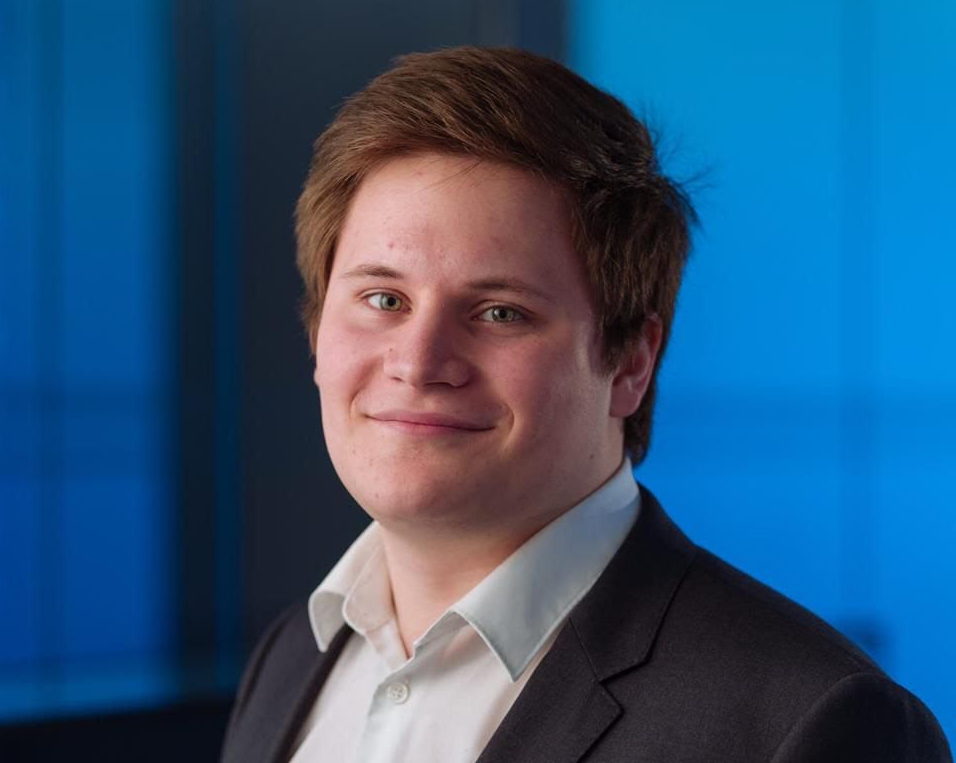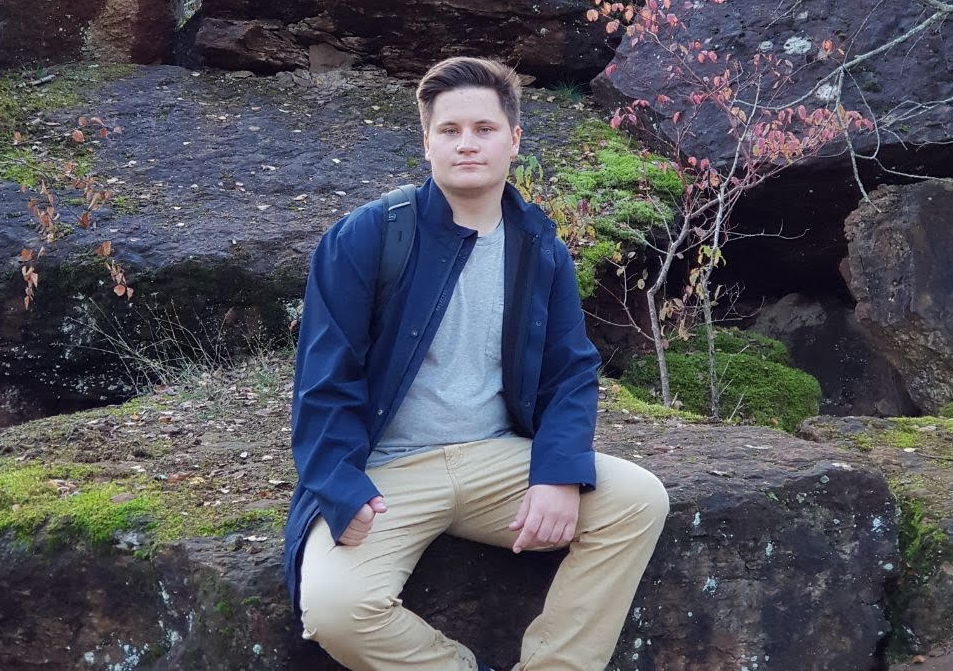"The most important thing a good university instills is constructive thinking"

Alexander Petrov graduated from ICEF Bachelor's Programme in 2016 with honours degree from HSE and first-class honours from the University of London. His outstanding performance earned him a master’s scholarship from the London School of Economics (LSE). Today, Alexander is pursuing a career as a data analyst at Amazon Luxembourg. In this interview, he explains why study abroad opportunities are easy to get, how students can gain the trust of LSE, what makes London a loveable place, and what Amazon’s twelve Leadership Principles are about.
What helped you become an honors student at ICEF, which in itself is quite an achievement?
I haven’t always been an honours student. Even though I graduated with honours from my school – it was an ordinary school with an advanced course of English – at ICEF I quickly realized I was much weaker in math than my classmates. I passed my first exam in Mathematical Analysis with a C. That had a sobering effect on me, but it had also spurred me into action. I started to work hard on my math skills and passed the second exam in the end of my first year with an A. It was my interest in Mathematical Analysis, I think, that helped make such a giant leap forward and it wouldn’t have been possible if I hadn’t done some extra learning. I ended up with an immense wealth of mathematical knowledge that lasted me until the end of my fourth year. And even when I started a job, in my third year, my grades remained high.
What motivated you to pursue math?
I own my motivation largely to my teacher Alexey Akhmetshin. His classes were some of the most interesting I have ever attended. The thing is that Economics can be taught from a variety of perspectives: it can be taught as sets of economic models, for example, or through the lens of social concepts. ICEF inspired me to explore the quantitative side of Economics. At high school, mathematics teaching is usually limited to a set of loosely related formulas and rules sufficient only to solve problems and eventually pass the Unified State Exam. I couldn’t make sense of what I was doing in math class before.
At ICEF, mathematics has acquired a clear purpose. And that purpose is to help solve economic problems and build economic models. What was more, the different phenomena we were exploring in class were approached from the perspective of cause-and-effect relationships. This had reoriented me, even reinvigorated my mindset. Next, I levelled up my programming skills and knowledge of computer science, which for some reason are considered second-class at high schools. I realized their importance only as an undergraduate student. There was an exciting course we had at ICEF, Excel and VBA Programming. It completely re-shaped my perception of quantitative courses and made me even more inspired to pursue math.
The course I loved best of all was in my third year and is called Abstract Mathematics. I really enjoyed it because it ushered me into a new way of seeing things and taught me to think out of the box. It can hardly be applied directly anywhere in life or work, but fundamentally it’s a great tool because it can accelerate your brain to higher frequencies.
What is it at this university that gets an adolescent brain rewired to think like adults?
There is, indeed, a striking contrast between a school student and an undergraduate. It manifests itself through social behavior and in educational processes. I still can’t understand why high school students aren’t treated the same way as undergraduates. At ICEF, you have the privilege of expressing your opinion without fear because it’s dialogue and open communication that the student-teacher interaction builds on, when students are free to talk to their professors at office hours.
With undergraduate students, being a mature learner suggests not only active listening but also active talking
It’s no longer taking dictation; this exchange of knowledge and opinions is designed to spur your interest and engagement. It allows you to see familiar school subjects, be it, for example, history, from a whole new angle.
ICEF boasts many brilliant students, some of whom are winners of national academic contests. How do you think the rest of the students, who may not be as high-achieving as them, feel about this fact?
The community you find yourself in at this university can play a determining role in your future. I personally didn’t plan to continue my studies, let alone embarking on a master’s degree abroad. But as I saw more and more of my classmates prepare to apply to Western universities I thought that maybe I was missing out something. My perception of study abroad opportunities was blurred by stereotypes like expensive, far away, difficult, new people, etc. But when I started to dig deeper I found out there were a lot of countries with tuition-free options, for example, Germany and Switzerland, as well as full scholarship opportunities to cover both tuition and accommodation.

I decided to follow in the footsteps of the best and the aspiring, and I have thus done myself a great favor. In ICEF’s friendly atmosphere of mutual support, I continuously stayed on top of the rating. It set me on the right track and shaped the quality of my performance and even life decisions. I think one’s social circle and university community have a lot to do with how he or she evolves as an individual and progresses in science or business.
Did ICEF live up to your expectations professionally?
It took me long to realize where I wanted to be in the industry. I started with a summer internship at a bank and continued building scoring models there right until the middle of my third year. Then, in my fourth year, I worked at The Coca-Cola Company. I got the job there after winning the Changellenge Cup Moscow 2014 case championship as a member of ICEF Math team. I wanted to try different companies and domains to understand which fit me best. And because the IB market was quite narrow in Moscow, I was more inclined to opt for consulting, especially given the close cooperative ties between ICEF Career Services and The Big Three, with opportunities for networking, internships and full-time jobs. Finally, I made the decision to go for the one-year master’s degree at LSE. London is just the right place to get a coherent picture of how the finance sector works and make a successful career jump.
How did you manage to win an LSE scholarship as an overseas student and can you tell more about it?
Every year, The London School of Economics awards two master's degree scholarships to high-achieving students in its undergraduate programs globally. First, you apply LSE for your graduate study and then for financial assistance. The decision is taken based on your academic merit and international exams rating. Like many ICEF graduates, and quite rightly, I thought it would be no problem for me to do the master’s in London. By that time, I had two academic awards as the programme’s highest-scoring student and that, I think, has helped me win the scholarship. If you look at LSE awards for academic achievement, ICEF students are consistently among their recipients.
Master's courses in the UK typically last for only a year. What were your planning to do after your master’s?
To be honest, 80% to 90% of what my LSE master’s programme taught me was already known to me at the admission stage, because the programme has originally been developed to fulfill the needs of learners with backgrounds as diverse as finance, engineering and social sciences. It begins with the basics that form part of ICEF’s introductory courses. At the same time, there is only one core course for students to create their learning paths around.

Your success in the programme measures by the number of credits successfully completed. In my programme, the core course was Matlab. It is possible to do some in-depth extras such as Stochastic Finance, but these require you to talk to your course supervisor first to explain why you think you need them.
When you are a graduate student in Britain, there are so many things for you to do within a course of just one year. The academic load is therefore modest, and the programme itself is essentially of hands-on nature with excellently structured contents. Undergraduates seek such graduate studies to get a good job in London and the majority of them come from countries other than Great Britain.
The careers services at LSE will proofread carefully your resume and prepare you for the job interview by walking you through tests and mock-interviews, even though it may sound a bit too late at this stage when you are already supposed to have applied for the job. I soon felt I was prepared to enter the workplace and I had my offer – from Bloomberg where I worked for eighteen months – by February.
Does foreign citizenship affect the hiring process?
There is some discrimination towards non-EEA nationals because visa sponsorship can be difficult for employers to provide. While European passport holders start their jobs on the day following the interview, recruiting a non-EEA passport holder requires proof from the employer of having been unable to find for the job an EEA national. Employers usually post vacancies on publicly available recruitment websites, where their offers stay for a month. Upon the expiry of these online offers, provided no EEA nationals responded and got hired, the employer has the right to hire a non-EEA national. Smaller companies just can’t afford this and do not consider foreigners as prospective candidates.
As a student, I did an internship at a foundation – a very enjoyable place to work at – that told me from the start that they would not be able to sponsor my visa. As for Bloomberg, it is a large employer with a more lenient visa policy and a budget for it and is, hence, a magnet for international students.
What were your job responsibilities at Bloomberg and how were they related to your Risk and Finance program at LSE?
I worked as a Global Data Analyst, although there wasn’t much analytics involved. We were writing Python scripts, but most of the time we helped clients deal with Bloomberg Terminal. I couldn’t find any growth opportunities in that job, so I soon left for Amazon and Luxembourg where Amazon has its headquarters for European operations – an excruciating choice and experience, but I did it. I wanted to be in a more technical stream, and Amazon was just the right place with great opportunities for growth. My professional goal outweighed all the social options I saw as a gift in London.
What did you like most about London?
That it is huge and has so many sides. Living is comfortable in London.
In London, I found myself surrounded by the friendly community of ICEF graduates. I never felt lonely there
Beautiful places and hidden gems can be found everywhere. You can find anything in London and build a life to your taste. Unlike it, Luxembourg has only 100,000 people and its diversity is minimal. But I got used to it. I made some friends and met people in Luxembourg and amazon who are graduates of HSE. Over the eighteen months that I’ve been living in Luxembourg I have travelled to all of its most picturesque nooks, especially in my first months there, and I have come to discover that its permanence and security have their charms, too. On the downside, Luxembourg has very high taxi fares and poor food delivery service. Its service sector generally leaves much to be desired. But at the same time, my employer has a lot to offer that makes me want to spend more time in the office, which comes with practically everything – the food, the coffee, friends, leisure, work.
What is your position at Amazon? What requirements are its new hires expected to meet?
I work as a data analyst/scientist and do data analysis. We use programming languages to optimize the processes or build simple models. And because Amazon is the largest marketplace with a far-reaching delivery network, our goal is to reduce delivery times to minimum possible levels. Before we go for a solution, we create models to predict what level of profit we can expect from it.

The requirements to candidates are fairly standard. For a position like mine, they included background in economics and mathematics, experience in data analytics and knowledge of programming languages. One thing that makes the Amazon team peculiar is its twelve Leadership Principles they want to see in candidates as a prerequisite for effective problem-solving. One of them reads “Leaders start with the customer and work backwards,” to give one example.
At my job interview, they asked me to describe cases that required me to come across as a leader and stand my ground, professionally. It may sound banal, but what Amazon HR are looking for is leaders. They seek to awaken in you self-encouragement, even though this may not look obvious at first. The candidate himself will only benefit from knowing that his employer is aware of and appreciates his personal qualities. By recalling your own life stories and how you coped with them, you update yourself on the things that helped you get your act together at the right moment to be your best self at work.
How does the workplace culture and Amazon’s corporate culture in general distinguish themselves?
I work with people who are smart and outgoing and are logical thinkers. Talks with them are always constructive and leading to personal growth in many different ways. I like that most of them come from engineering backgrounds, unlike me and a few other guys who are originally economists, because mathematical thinking is what helps us do our work faster and more efficiently. Amazon is upholding this culture by hiring people who share its values and mindset, and this is probably what lies at its core.
There's no official dress code and no one cares where you are working from. It’s what you deliver as results. That is, indeed, a winning workplace strategy
What kind of a career path do you see for yourself at Amazon?
Our office is growing swiftly. I was the fifth or the sixth to join the team and now we are more than thirty compared to one and half year ago. Amazon sees its employees changing teams and designations as a beneficial experience that brings them new competencies. Horizontal promotion is easier here. I am planning to remain under the same designation but with an increased work horizon, taking the best advantage of what this huge company offers.
Your knowledge of economics, how can you measure its usefulness in your job?
This question brings me to start using Statistical and Economic Analysis to measure my life. The most important thing a good university instills is constructive thinking. To put it simply, a good university teaches you the basics of logic and critical analysis for you to be able to use them as tools for out-of-the-box solutions. This ability, as I learned from my experience, will come in handy in any workplace. It’s not the applied skills – these come with practice – it’s this ability that one should seek in universities in the first place. And this is also the reason why the world’s most influencial schools are sticking to the academic culture of the fundamental education as what can shape the right kind of mindset.
Alexey Akhmetshin